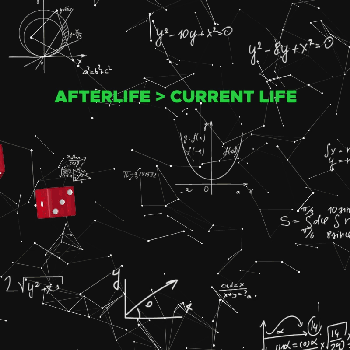Avowed atheist, the late Christopher Hitchens, often accused theists of wanting to believe in a Heaven because they want “the party to go on”. (Christopher Hitchens was this scary man with a deep voice who always reminded me of my Dad when he gets really angry and I am in big trouble.)
Hitchens compared religious references of Heaven to a never-ending party because he felt that people were afraid of no longer existing after they die, of losing their identity or connection to loved ones. They want to imagine some kind of world where they will once again be alive and able to experience all the fun they had while on earth, but this time without any of the sorrows or negatives. They want to know that they will once again be reunited with Mom, Uncle Charlie, and their hamster Gerald.
It’s interesting to note that this idea of existing after death is a relatively Western concept. Eastern philosophy is a bit different. We do not want the party to go on. Especially one that involves grey hairs, cellulite craters, saggy skin, saggier body parts, and general old age as the night grows longer. (Not that I have real experience with any of these myself yet, but theoretically speaking!)
Instead we wish for jeevan mukti or moksha which is a release from reincarnation, or the cycle of rebirth. Our goal is ceasing to exist as a constantly suffering, vulnerable, and transitory lifeform. The final resting state is simply imagined to be one with no hardships or even existence, as opposed to a fun, colorful, heavenly party with harps and angels. The Eastern vision of Heaven may sound a bit drab at first, but think of it as a dreamless sleep where you get to nap for as long as you want. On gazillion-thread-count sheets. Not so bad now, is it?

In Hindu teachings, it is thought that both Heaven and Hell are accessible to us in our current state as humans. The idea of a separate Heaven or Hell, after this life, does not really exist – except, as just discussed, the heavenly feeling of liberation from reincarnation. But it is believed that one can be free from one’s physical body even now, in our current life, simply through the use of the mind. Detachment of one’s expectation of a permanent happiness from temporary, worldly pleasures is supposedly the key to bliss on earth. Perhaps comparable to the old Native Indian way of living – one of community, sharing, harmony with nature, simplicity, respect for young and old, and minimal material comforts – which was considered a sustainable, loving way to live together during our short time here. Or maybe it is possible to have another kind of Utopia, one where we can still have our chocolate and Mc-80-inch-TVs. (I own the former and am addicted to the latter. Yeah, yeah, I know I don’t come across as completely enlightened yet, but I’m WORKING ON IT!)
Meanwhile, it is believed that Hell on earth can also be experienced. Many years ago I visited a company in Bombay to look into the creation of a green eco bag with my company logo that I wanted to gift to clients in the US. After some initial small talk, the shrewd, money-minded owner took me to the inner chambers of his factory, to show me where the work was being done. I will never forget what happened next. When he opened the door to a small room with about twenty women and children inside, the heat and stench hit me squarely in the face. It comprised the most horrific working conditions I had ever seen, a dark, humid, airless room with no human comforts, just a concrete floor and frail women and children hand stitching garment after garment. Not even sewing machines were visible, it was a simple line of humans crouched on the floor with needle, thread, and nothing else. Not even a window.
OTHER POSTS YOU MIGHT LIKE
To me, this scenario was the quintessential example of Hell on earth. The devil, fire, and forced labor was all here, in a small sweatshop in Bombay. Hell can also be seen in refugee camps, crowded jails, ISIS videos, battle sites, domestic abuse shelters, slums or simply in ordinary, everyday life.
The reality of the atrocities actually suffered on Earth can be far more horrendous than the flimsy scare tactics dreamt up by religious books and leaders. So to the atheists who believe that theists and agnostics are desperately clinging to the idea of a higher power because they wish to remain eternal – I would like to emphatically and clearly say that this is not true.
There are many of us, like myself, who have no need to continue existing as an identity or as anything at all. We are happy enough to have an end to our suffering, whether that happens within the framework of a random or planned design. If our suffering ends simply because we are a random product of the Big Bang and we will cease to exist once our bodies break down – we are okay with that. There is no need to believe in a planned or intelligent design or a God or Heaven simply for the hope that we continue to enjoy the party. The goal is an end to suffering, not a continuation of fun times.
So on behalf of all party poopers who prefer an eternal nap to an eternal dance floor — let the party go on without us!

